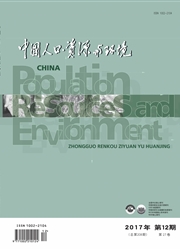

 中文摘要:
中文摘要:
本文基于2010年底对全国6个省1118个样本农户的调查数据。对农村各类生活固体垃圾的排放及其影响因素进行了实证分析。首先。运用调查数据描述农村生活固体垃圾排放量及排放结构的现状;然后对生活固体垃圾排放量进行单因素分析;最后,运用计量模型,在控制其他影响的情况下。对生活固体垃圾排放量的影响因素进行分析。研究发现。我国2010年农民人均每天生活固体垃圾排放量约为1.07kg,在地区闻存在显著差异.其中,以经济最为发达的浙江省最高,达到1.19奴.而云南省最低。只有0.87kg。厨余类垃圾是我国农村生活固体垃圾的最主要构成部分,所占比例高达27.6%。研究结果还表日胃,我国农村生活固体垃圾的排放量不仅受收入水平的影响。还受到相关的政策因素以及社会经济条件等其他因素的影响。
 英文摘要:
英文摘要:
Based on a field survey of 1,118 rural households conducted in 2010 in 6 provinces, this paper empirically analyzes rural solid waste disposal and its determinants. First, we statistically describe the current status of rural solid waste disposal and its components. Second, we identify the determinants of solid waste disposal with factor analysis method. Finally, we examine the determinants of domestic solid waste disposal using econometric models. Our results show that daily solid waste disposal in the sampled rural areas is 1.07 kg per capita, but it varies significantly across regions. Zhejiang, the most developed province in our sample, generates the highest level of solid wastes at 1.19 kg per capita, and Yunnan is at the lowest with 0.87 kg of disposal per capita per day. Kitchen waste, accounting for 27.6% , is the largest component in the total discharge. The identified determinants of waste disposal include income, relevant policy factors and a number of social and economic factors as well.
 同期刊论文项目
同期刊论文项目
 同项目期刊论文
同项目期刊论文
 期刊信息
期刊信息
